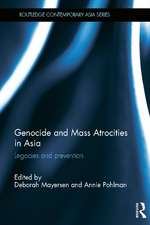Unheeded Hinterland: Identity and sovereignty in Northeast India
Editat de Dilip Gogoien Limba Engleză Hardback – 19 ian 2016
This book will interest scholars and researchers of politics and international relations, sociology and social anthropology, area studies, peace and conflict studies, especially those concerned with South Asia and Northeast India.
| Toate formatele și edițiile | Preț | Express |
|---|---|---|
| Paperback (1) | 449.41 lei 6-8 săpt. | |
| Taylor & Francis – 15 ian 2018 | 449.41 lei 6-8 săpt. | |
| Hardback (1) | 1108.37 lei 6-8 săpt. | |
| Taylor & Francis – 19 ian 2016 | 1108.37 lei 6-8 săpt. |
Preț: 1108.37 lei
Preț vechi: 1351.68 lei
-18% Nou
Puncte Express: 1663
Preț estimativ în valută:
212.08€ • 222.03$ • 175.49£
212.08€ • 222.03$ • 175.49£
Carte tipărită la comandă
Livrare economică 05-19 aprilie
Preluare comenzi: 021 569.72.76
Specificații
ISBN-13: 9781138100091
ISBN-10: 1138100099
Pagini: 266
Dimensiuni: 138 x 216 x 20 mm
Greutate: 0.43 kg
Ediția:1
Editura: Taylor & Francis
Colecția Routledge India
Locul publicării:Oxford, United Kingdom
ISBN-10: 1138100099
Pagini: 266
Dimensiuni: 138 x 216 x 20 mm
Greutate: 0.43 kg
Ediția:1
Editura: Taylor & Francis
Colecția Routledge India
Locul publicării:Oxford, United Kingdom
Public țintă
PostgraduateCuprins
List of Abbreviations. About the Contributors. Acknowledgement. Part 1: Locating the Problem 1. Introduction: Sovereignty and National Identity: The Troubled Trajectory in Northeast India Part 2. Situating the Debate: Interface of Sovereignty and Self Determination 2. Sovereignty at the Frontiers: Contests and Contradictions 3. Self Determination, Multi Ethnic State and quest for Assamese Nationhood 4. ‘Sarbabhoum Asom’: Three Public Discourses 5. ‘Swadhin Asom’: Contesting Territories and Linkages Part 3. Migration, Contested Citizenship and the Identity 6. Immigration, Indigeneity and Identity: The Bangladeshi Immigration Question in Assam Chandan Kumar Sharma 7. The State and the Migrants: Contextualizing the Citizenship Debate in Assam Part 4. National Consciousness: The Role of Students and Literary Bodies 8. Identity Consciousness and Students’ Movements: The Role of AASU 9. Assamese Identity and the Ethnic Dissent: Asom Sahitya Sabha at the Crossroads Part 5. Civil Society, Indian State and Conflict Resolution 10. Between State and the Insurgents: Violation of Human Rights in Assam 11. The ULFA and Indian State: Role of Civil Society in Resolving Conflict 12. .Accommodating Differences: The Indian Democracy and Assamese Nationalism 13. Postscript: Ending the Impasse and Reintegrating the Northeast India Glossary. Index.
Notă biografică
Dilip Gogoi is Assistant Professor at the Department of Political Science and teaches International Politics and Human Rights at Cotton College, Cotton College State University, Guwahati, Assam, India. An alumnus of Jawaharlal Nehru University, New Delhi, Gogoi has edited Beyond Borders: Look East Policy and Northeast India (2010), co-edited Shifting Terrain: Conflict Dynamics in Northeast India (2012) and Marginal Frontier: Select Essays on Northeast India (2012). His research interests span Northeast India and transnational relations.
Descriere
This book presents a comprehensive account of the debates on sovereignty, self-determination and nationalist upsurges in India’s Northeast, especially Assam. At a deeper level, it analyses how multi-ethnic societies engage with the nation state. Based on the framework of international relations and geo-politics, the volume locates internal tensions and contradictions among different ethnic groups, alongside the complex interrelationships between the centre and the region. It also proposes a new structure of ‘Common Ethnic House’ to resolve persistent inter-ethnic tensions among different communities and the impasse between the Northeast and the centre.
This book will interest scholars and researchers of politics and international relations, sociology and social anthropology, area studies, peace and conflict studies, especially those concerned with South Asia and Northeast India.
This book will interest scholars and researchers of politics and international relations, sociology and social anthropology, area studies, peace and conflict studies, especially those concerned with South Asia and Northeast India.















